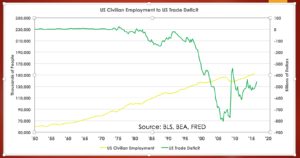Beating the horse-that-should-have-died-long-ago-but-instead-continues-to-gallop-madly.
30 July 2018
Mr. Nolan McKinney
Mr. McKinney:
I’m unsure why you think that an op-ed by Peter Morici will cause me to question my commitment to a policy of unilateral free trade. Prof. Morici consistently reveals his poor understanding of the economics of trade, and the essay of his that you sent today is par for his course.
Consider, for example, Morici’s call for “a managed trade arrangement [with China] that rebalances bilateral commerce.” I’m sorry, but this statement is beyond silly. To believe that in a world of nearly 200 countries – and especially when one of the country’s currency serves as the global reserve currency and when cross-country investments are routine – each pair of countries should have exports to the other equal in value to imports from the other is sure evidence of deep economic ignorance.
Consider also Morici’s incessant assertion that U.S. trade deficits with the rest of the world reduce overall employment in the U.S. This assertion, too, is wildly mistaken – largely, but not only, because Morici ignores the fact that a U.S. trade (or, more precisely, current-account) deficit is matched dollar-for-dollar by a U.S. capital-account surplus (meaning that the dollars in the U.S. current-account deficit return to the U.S. as dollars invested here).
But I tire of repeating the theoretical reasons why Morici’s assertion is mistaken. So I instead offer some empirical evidence. In the graph below, the yellow line is U.S. civilian employment from 1950 through 2015. The green line is the U.S. trade deficit over those same years. As is plainly seen, there is in these data no evidence whatsoever that U.S. trade deficits reduce overall U.S. employment.
Sincerely,
Donald J. Boudreaux
Professor of Economics
and
Martha and Nelson Getchell Chair for the Study of Free Market Capitalism at the Mercatus Center
George Mason University
Fairfax, VA 22030
(I thank my research assistant Jon Murphy for creating this graph for me.)




